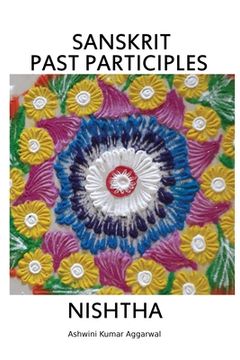Compartir
Sanskrit Past Participles Nishtha (en Sánscrito)
Ashwini Kumar Aggarwal
(Autor)
·
Devotees of Sri Sri Ravi Shankar Ashram
· Tapa Blanda
Sanskrit Past Participles Nishtha (en Sánscrito) - Aggarwal, Ashwini Kumar
$ 31.330
$ 43.520
Ahorras: $ 12.190
Elige la lista en la que quieres agregar tu producto o crea una nueva lista
✓ Producto agregado correctamente a la lista de deseos.
Ir a Mis Listas
Origen: Estados Unidos
(Costos de importación incluídos en el precio)
Se enviará desde nuestra bodega entre el
Jueves 18 de Julio y el
Martes 30 de Julio.
Lo recibirás en cualquier lugar de Chile entre 1 y 3 días hábiles luego del envío.
Reseña del libro "Sanskrit Past Participles Nishtha (en Sánscrito)"
Niṣṭhā or Nishtha i.e. निष्ठा in Sanskrit Grammar is a kridanta word formed by adding a कृत् affix. These kr̥t affixes are क्त and क्तवतु (kta, ktavatu ).Sanskrit Literature, especially the Bhagavad Gita and the Upanishads have frequent use of निष्ठा words, primarily as Participles used as Verbs. And that too the Past Participle Passive क्त (kta) used in the sense of Past Tense, in place of the Verbs made using the लङ् affix. The beauty of using निष्ठा lies in the fact that the same निष्ठा Participial Verb can be used in first person, second person or third person with no change in spelling. (This is not true of using लङ् affixed Verbs).Nishtha words are also used as Adjectives in a sentence.Another significance of using निष्ठा words is in a spiritual context, since the dictionary meaning of Nishtha is Determination or Commitment. Also Faith, Devotion and Assimilation of Knowledge.This handbook lists the Nishtha kta & ktavatu forms of entire Dhatupatha Roots, viz Dhatu Serial No 1 to 1943.Additionally for the serious student, - the Ashtadhyayi Sutra(s) are given if final Nishtha form is complex for each and every such Root.- Internal Grouping of Roots is clearly marked and easily accessible.- Accented Roots are listed.- English Meaning of each Root is listed.- Root attributes viz. P/A/U, Set/Anit/Vet, Sakarmaka/Akarmaka/Dvikarmaka are listed for each Root.- Original Root as in Dhatupatha of Panini is given along with Root Anga ready for Conjugation.- iii/1 Third Person Singular, Present Tense Active लट् कर्त्तरि Verb form is listed for each Root.
- 0% (0)
- 0% (0)
- 0% (0)
- 0% (0)
- 0% (0)
Todos los libros de nuestro catálogo son Originales.
El libro está escrito en Sánscrito.
La encuadernación de esta edición es Tapa Blanda.
✓ Producto agregado correctamente al carro, Ir a Pagar.

